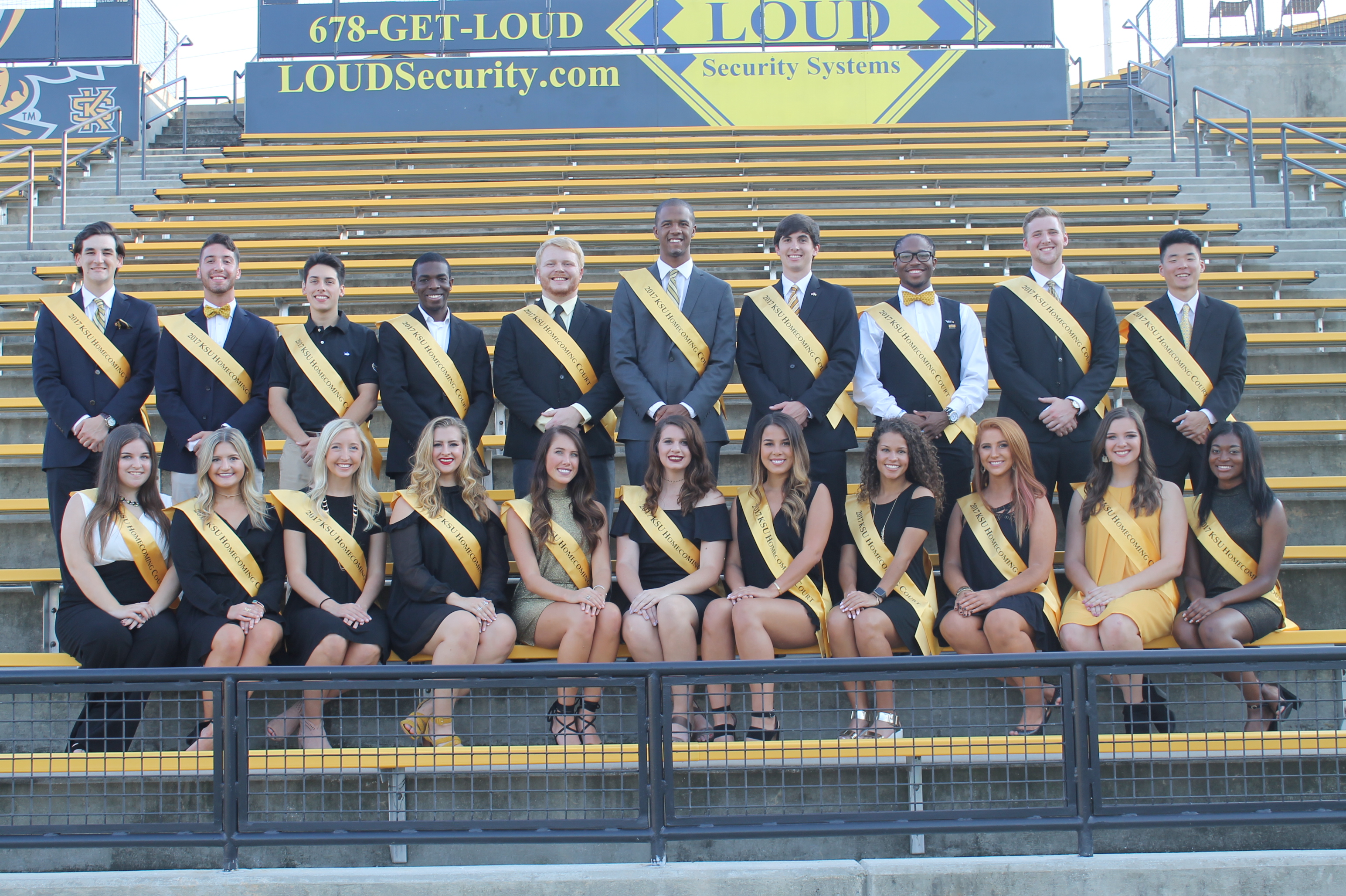This year’s homecoming court, held as part of the 2017 Kennesaw State homecoming festivities, did not see a change in the ethnic makeup of the group.
In 2015, the court of 10 candidates was split 50/50 between White candidates and non-White candidates. The 2016 court saw seven non-White candidates out of the 10. This year’s court of 21 students had five non-White candidates.
“The old process allowed organizations that participated in spirit competitions to nominate one of their members,” said Drew Harvill, the associate director for student activities. “From there, all those selected were added onto the ballot. Now, the selection process focuses more on the student’s academics, extracurricular involvement, civic engagement and school pride.”
The selection process of the court has changed significantly since 2014.
“The goal was to find the best students on campus that KSU has to offer that also have a real passion for the university,” Harvill added.
The Student Homecoming Committee increased the number of positions for homecoming court, going from only having King and Queen to adding four more: Duke, Duchess, Prince and Princess.
“While I met these phenomenal people who welcomed me with open arms, it still bothers me that I was the only African-American female on court this year,” said junior class nominee Destiny Clark. “It also bothers me because I don’t think the diversity of KSU was represented at all.”
Clark was surprised to be selected as a nominee for Homecoming Princess.
“Going into this and seeing the people I was around was a total shock to me,” Clark said. “I didn’t know that people from the Panhellenic Council and IFC did this, and that’s why I was surprised to even be selected.”
Students who identify as Native American, Alaskan Native, Asian, Black, Hispanic, Native Hawaiian, other Pacific Islander or Multi-racial accounted for 38.79 percent of KSU’s 2016 fall enrollment as reported by the university’s 2016-2017 Fact Book. Enrollment of non-White students has seen an increase of 5.3 percent over the past five years.
While this year’s homecoming court is not representative of the racial diversity of the campus, students of color, as well as all students who meet all the requirements, are encouraged to get involved with various on-campus organizations so they have their talents recognized for the next homecoming.
“I still wouldn’t trade this experience for the world,” Clark said. “I have truly met the most amazing people that I wouldn’t have met if I didn’t do this.”
The KSU homecoming website describes the purpose of the court as a way to “recognize members of the student body who make invaluable contributions to the KSU community and represent the core ideals of Kennesaw State University as student leaders.”
Students voted on Owl Express for their favorites, and the winners were announced at the homecoming football game against Liberty: Duke is Steven Klausman, Duchess is Molly Trantham, Prince is Steve Kim, Princess is Sam Arnold, King is Nevin McRay and Queen is Taylor Snow.





Come on …
“The old process allowed organizations that participated in spirit competitions to nominate one of their members… Now, the selection process focuses more on the student’s academics, extracurricular involvement, civic engagement and school pride.”
This should tell you something about the reason for the demographic change. When a system moves to merit-based selection, those most-qualified will become more represented. Affirmative action is racist and so are other systems utilizing racial quotas, which give one group of people an unfair, systemic advantage over other groups.
Stop worrying about race quotas. Instead, focus on merit, which is what the change in demographics you mention represents. Studies have shown diversity for diversity’s sake is not beneficial, so stand behind the truth instead of lies designed to push your political agenda for displacing those who deserve to be there with less deserving people.
“affirmative action is racist” give me a break. As far as Merit-Based goes, what exactly qualifies someone to be on homecoming court over someone else?
> “affirmative action is racist” give me a break.
I won’t give you a break when it comes to simple logic. Keep in mind this is a university, so try at least to retain some semblance of academia. To discriminate against someone based on race is racism. If I said I was going to start enforcing a quota where I would only teach 1/2 as many black students as white students that applied, you would call me racist. Yet universities can do this and you give them a pass?
> As far as Merit-Based goes, what exactly qualifies someone to be on homecoming court over someone else?
Did you even read the article or my comment, or were you so excited to speak that you forgot what you were even outraged about? Here, I’ll quote my first reply again, which is a quote from the article:
“The old process allowed organizations that participated in spirit
competitions to nominate one of their members… Now, the selection
process focuses more on the student’s academics, extracurricular
involvement, civic engagement and school pride.”